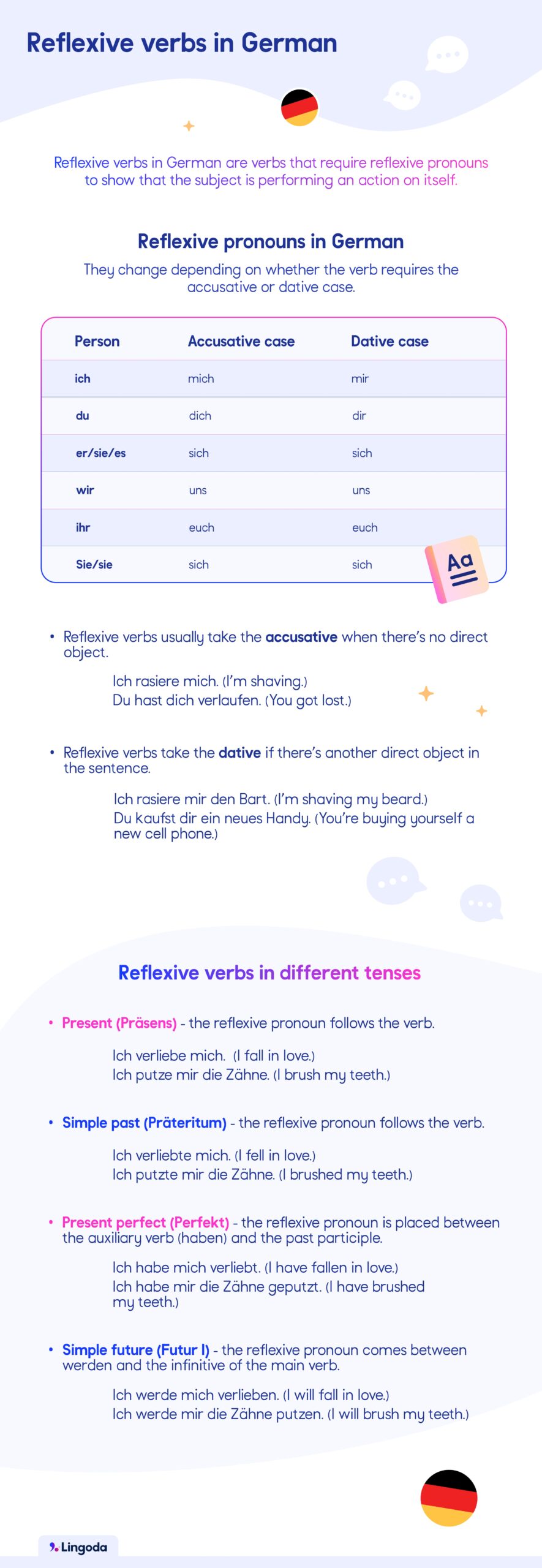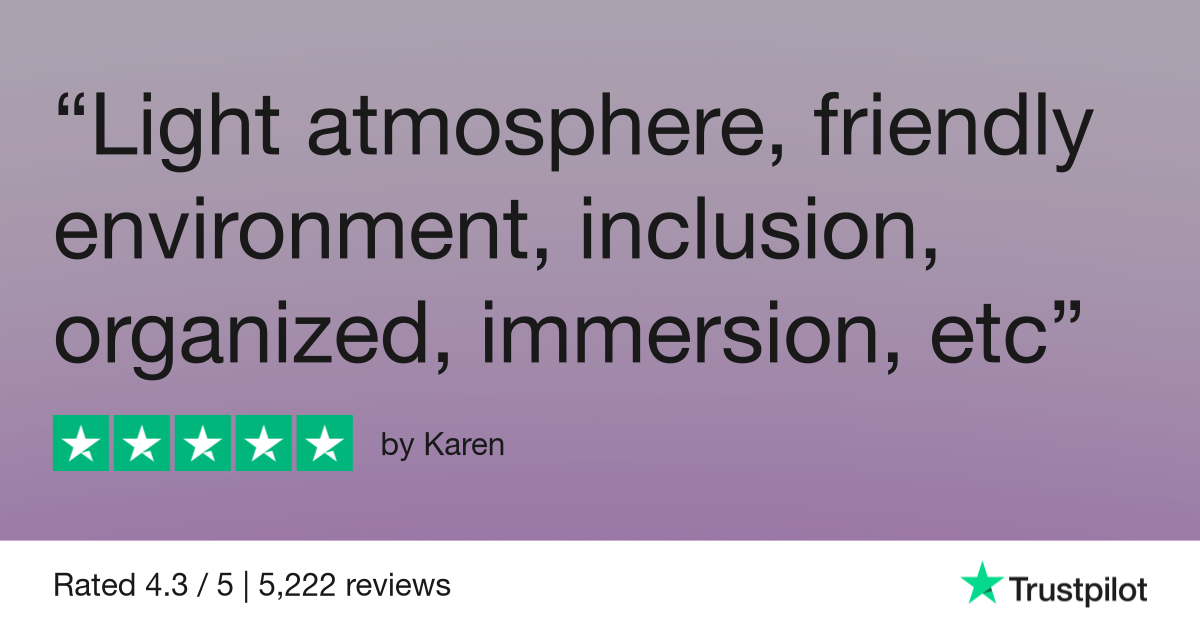Reflexive verbs in German: How to use, conjugate and understand them

Want to talk about your daily routine, feelings or thoughts in German? You’ll need reflexive verbs.
Brushing your teeth, getting dressed, introducing yourself: these are all situations that demand reflexive verbs in German. You’ll come across these verbs far more often than in English, so it’s worth understanding how they work.
In this article, you’ll learn how reflexive verbs are formed, when to use the accusative or dative case and how to combine a reflexive verb with the right reflexive pronoun. You’ll also get a list of common reflexive verbs and plenty of example sentences to see them in action.
- What are reflexive verbs in German?
- Understanding reflexive pronouns in German
- List of common reflexive verbs in German
- Reflexive verbs in action: Sentence examples
- Reflexive verbs in different tenses
- FAQS
What are reflexive verbs in German?
Reflexive verbs in German are verbs that use a reflexive pronoun to express an action the subject performs on itself. For example:
- Ich wasche mich. (I wash myself.)
While reflexive pronouns are often optional in English, they’re required in German. Moreover, German features an impressively long list of reflexive verbs — some of which don’t exist in English at all:
- Ich bewerbe mich. (I apply.)
- Ich habe mich geärgert. (I got annoyed.)
Reflexive vs. non-reflexive verbs: What’s the difference?
In German, some verbs can be used with or without a reflexive pronoun — and this can completely change the meaning of a sentence.
Take the verb erinnern. When used reflexively (sich erinnern), it refers to someone remembering something themselves. In the non-reflexive form (jemanden erinnern), it means reminding someone else of something.
| Verb form | Meaning | Example |
| sich erinnern (an) | to remember | Er hat sich an ihren Geburtstag erinnert. (He remembered her birthday.) |
| jemanden erinnern (an) | to remind someone | Ich erinnere meine Mutter an meinen Geburtstag. (I remind my mother of my birthday.) |

Learn German with Lingoda
How it works

Understanding reflexive pronouns in German
German reflexive pronouns typically accompany reflexive verbs and change depending on whether the verb requires the accusative or dative case.
Take a look at the table below to learn and memorize the cases:
| Person | Accusative case | Dative case |
| ich | mich | mir |
| du | dich | dir |
| er/sie/es | sich | sich |
| wir | uns | uns |
| ihr | euch | euch |
| Sie/sie | sich | sich |
If you’d like to learn more, read our short guide to reflexive pronouns in German.
How to choose between accusative and dative
The choice between accusative and dative reflexive pronouns depends on the object the action is being directed toward.
Reflexive verbs usually take the accusative, especially when the subject is doing something to itself and there’s no other direct object:
- Ich rasiere mich. (I’m shaving.)
- Du hast dich verlaufen. (You got lost.)
If there’s another direct object in the sentence, the reflexive pronoun switches to the dative:
- Ich rasiere mir den Bart. (I’m shaving my beard.)
- Du kaufst dir ein neues Handy. (You’re buying yourself a new cell phone.)

List of common reflexive verbs in German
Top 25 A1-A2 reflexive verbs (with translation)
Let’s start with the most common and important reflexive verbs you’ll come across early in your German learning journey:
Accusative case
| Verb | Translation |
| sich anziehen | to get dressed |
| sich ärgern (über) | to be annoyed about |
| sich ausruhen | to rest |
| sich ausziehen | to undress |
| sich duschen | to shower |
| sich erinnern (an) | to remember |
| sich freuen (auf/über) | to be happy about/to look forward to |
| sich fühlen | to feel |
| sich hinlegen | to lie down |
| sich interessieren (für) | to be interested in |
| sich setzen | to sit down |
| sich treffen (mit) | to meet (with) |
| sich verabschieden | to say goodbye |
| sich vorstellen | to introduce oneself |
| sich waschen | to wash oneself |
Dative case
| Verb phrase | Translation |
| sich die Haare bürsten | to brush one’s hair |
| sich die Haare kämmen | to comb one’s hair |
| sich die Hände waschen | to wash one’s hands |
| sich etwas ansehen | to look at something |
| sich etwas holen | to get something for oneself |
| sich etwas kaufen | to buy oneself something |
| sich etwas merken | to memorize something |
| sich etwas bestellen | to order something for oneself |
| sich etwas kochen | to cook something for oneself |
| sich wehtun | to hurt oneself |
Intermediate reflexive verbs for B1 learners
Now we’ll look at reflexive verbs typically learned at the intermediate level. These are used to talk about more complex actions, personal decisions, emotions or social situations:
Accusative case
| Verb | Translation |
| sich bemühen (um) | to make an effort |
| sich bewerben (um) | to apply for |
| sich verhalten | to behave |
| sich erkundigen (nach) | to inquire about |
| sich gewöhnen (an) | to get used to |
| sich irren | to be mistaken |
| sich schämen (für) | to be ashamed of |
| sich wundern (über) | to be surprised about |
| sich entscheiden | to decide |
| sich verlieben | to fall in love |
Dative case
| Verb phrase | Translation |
| sich etwas einbilden | to imagine something falsely |
| sich etwas leisten | to afford something |
| sich etwas überlegen | to think about something |
| sich etwas vorstellen | to imagine something |
| sich etwas wünschen | to wish for something |
As you can see in the lists above, some reflexive verbs are part of the group of verbs with prepositions in German. You’ll need to learn these combinations by heart, because the prepositions often can’t be guessed from the verb alone.
Reflexive verbs in action: Sentence examples
Now that you’ve learned which of the most common verbs in German are reflexive, it’s time to see how they work in real sentences.
Sentences with accusative reflexive verbs
- Ich interessiere mich sehr für Kunst und freue mich auf die Ausstellung morgen. (I’m very interested in art and I’m looking forward to the exhibition tomorrow.)
- Wir treffen uns um acht und verabschieden uns gegen Mittag. (We’re meeting at eight and saying goodbye around midday.)
- Sie erinnert sich nicht mehr an den Namen des Hotels. (She no longer remembers the name of the hotel.)
- Setz dich bitte, der Unterricht beginnt gleich. (Please sit down, the lesson is about to start.)
Sentences with dative reflexive verbs
- Wir sehen uns heute Abend einen neuen Film an. (We’re watching a new movie tonight.)
- Ich habe mir überlegt, im Sommer einen Deutschkurs zu machen. (I’ve been thinking about taking a German course in the summer.)
- Er hat sich gestern eine neue Jacke gekauft. (He bought himself a new jacket yesterday.)
- Nachdem ich zu Hause angekommen bin, wasche ich mir immer zuerst die Hände. (After coming home, I always wash my hands first.)
How context changes the meaning
Among reflexive verbs, the meaning can change depending on the case used. For example, let’s consider sich vorstellen:
- Ich stelle mich vor. (I introduce myself.) = accusative
- Ich stelle mir etwas vor. (I imagine something.) = dative
Compare these two examples:
- Du hast dich bei den Gästen vorgestellt. (You introduced yourself to the guests.)
- Stell dir vor, wir könnten die Welt bereisen! (Imagine, we could travel the world!)
As you can see, a small grammatical change can lead to a big difference in meaning.
Reflexive verbs in different tenses
Reflexive verbs in German follow the usual rules regarding tense, but it’s important to remember that the reflexive pronoun must always match the subject in both person and case.
Let’s take a closer look at how these verbs behave in different tenses.
Present (Präsens)
- Ich verliebe mich. (I fall in love.)
- Ich putze mir die Zähne. (I brush my teeth.)
Here, the verb is conjugated as usual and the reflexive pronoun follows the verb.
Simple past (Präteritum)
- Ich verliebte mich. (I fell in love.)
- Ich putzte mir die Zähne. (I brushed my teeth.)
In the simple past, only the verb form changes. The position of the reflexive pronoun remains the same as in the present tense.
Present perfect (Perfekt)
- Ich habe mich verliebt. (I have fallen in love.)
- Ich habe mir die Zähne geputzt. (I have brushed my teeth.)
In the present perfect, a compound tense, the reflexive pronoun is placed between the auxiliary verb (haben) and the past participle.
Simple future (Futur I)
- Ich werde mich verlieben. (I will fall in love.)
- Ich werde mir die Zähne putzen. (I will brush my teeth.)
The simple future is also a compound tense. The reflexive pronoun comes between the auxiliary verb werden and the infinitive of the main verb.
Modal verbs + reflexive verbs
Reflexive verbs can also be used with modal verbs like möchten, sollen, können, wollen, dürfen and müssen. In this case, the reflexive pronoun comes between the modal verb and the infinitive of the main verb:
- Ich möchte mich anmelden. (I would like to register.)
- Ich muss mir neue Schuhe kaufen. (I have to buy new shoes.)
How do I know when to use accusative or dative with reflexive verbs?
When the action is directed at the subject and there’s no other object, use the accusative reflexive pronoun. If there’s another object in the sentence, the reflexive pronoun takes the dative case.
Is sich freuen accusative or dative?
Sich freuen takes the accusative reflexive pronoun, because the action is directed at the subject and the verb doesn’t require an additional object.
Reflexive verbs: One step closer to confident, correct German
Reflexive verbs play an important role in German, as they appear more frequently than in English. They’re not difficult to learn since they follow standard verb patterns, but you’ll need to know when to use the accusative or dative pronoun and be aware that their meaning can change depending on context.
Whether you’re just starting with German A1 or working toward German B1, Lingoda offers online language courses that provide structure and support. With small group classes and real-life communication, you’ll start speaking with confidence from Day One.

Learn German with Lingoda
How it works

















